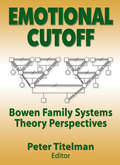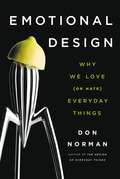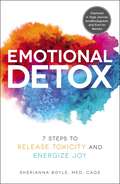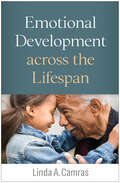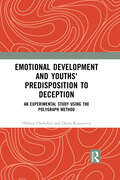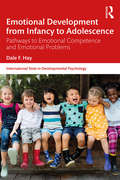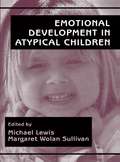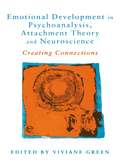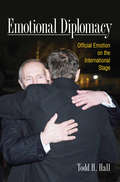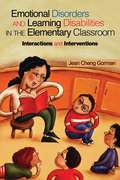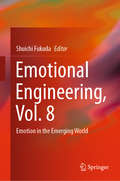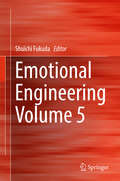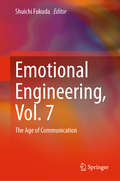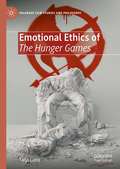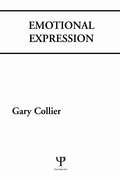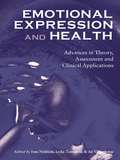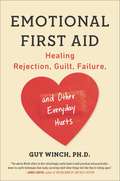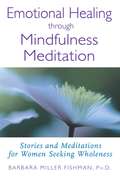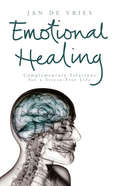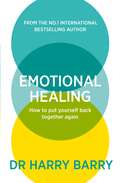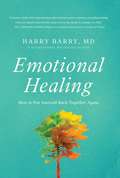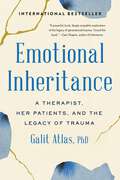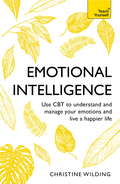- Table View
- List View
Emotional Contagion
by John T. Cacioppo Elaine Hatfield Richard L. RapsonWhen people are in a certain mood, whether elated or depressed, that mood is often communicated to others. When we are talking to someone who is depressed it may make us feel depressed, whereas if we talk to someone who is feeling self-confident and buoyant we are likely to feel good about ourselves. This phenomenon, known as emotional contagion, is identified here, and compelling evidence for its effects is offered from a variety of disciplines--social and developmental psychology, history, cross-cultural psychology, experimental psychology, and psychopathology. The authors propose a simple mechanism to account for the process of contagion. They argue that people, in their everyday encounters, tend automatically and continuously to synchronize with the facial expressions, voices, postures, movements, and instrumental emotional behaviors of others. Emotional experiences are affected, moment-to-moment, by the feedback from such mimicry. In a series of orderly chapters, the authors provide observational and laboratory evidence to support their propositions. They then offer practical suggestions for clinical psychologists, physicians, husbands and wives, parents, and professionals who wish to become better at shaping the emotional tone of social encounters.
Emotional Cutoff: Bowen Family Systems Theory Perspectives
by Peter TitelmanWiden your therapeutic focus and help your family therapy clients learn to bridge generational separation! This book delivers professional insights on one of the least understood but most important of Bowen's concepts-emotional cutoff. The first book on this subject, Emotional Cutoff: Bowen Family Systems Theory Perspectives examines this aspect of Bowen family system theory and shows how emotional cutoff can be understood and addressed in therapy. Emotional Cutoff also provides beneficial case examples, empirically based studies, helpful figures, and family diagrams. This information-packed volume includes a chapter by the developers of Family of Origin Response Survey (FORS)-an instrument that measures the degree to which one is emotionally reactive to their mother or father-that outlines the process and its scoring methodology and demonstrates its reliability. The book also includes chapters on emotional cutoff and societal processes-and even how emotional cutoff manifests in the animal kingdom! From the editor: "In this book, the phenomenon of emotional cutoff is explored from many perspectives. The contributors have illustrated the presence of cutoff in non-human species, in relation to evolutionary theory, brain physiology, reproduction, in the lives of therapists and the individuals and families they work with in clinical practice, and in societal emotional process-in a variety of contexts. In addition, the development of an instrument for measuring emotional cutoff is presented." Emotional Cutoff is a comprehensive examination of this fascinating aspect of Bowen family systems theory, including: a theoretical overview-as well as a look at cutoff in various animal species and an examination of the way the physiology of the human brain is related to the phenomenon of emotional cutoff bridging emotional cutoff in the therapist's own family, as related by three Bowen systems therapists and a genealogist who is trained in Bowen theory-essential reading for all therapists! research and clinical applications-including interventions you can put into practice right away with clients who are dealing with divorce, depression, domestic violence, or child abuse societal applications-a look at emotional cutoff and societal process in Russian citizens, in Holocaust survivors, in immigrants, and in Israeli/Palestinian relations Emotional Cutoff: Bowen Family Systems Theory Perspectives provides exciting possibilities for treating emotional cutoff in people trying to manage their unresolved issues. It is an essential resource for family therapists, counselors, pastoral counselors, family-oriented psychologists, social workers, psychiatrists, and psychiatric nurses.
Emotional Design: Why We Love (or Hate) Everyday Things
by Donald A. NormanDid you ever wonder why cheap wine tastes better in fancy glasses? Why sales of Macintosh computers soared when Apple introduced the colorful iMac? New research on emotion and cognition has shown that attractive things really do work better, as Donald Norman amply demonstrates in this fascinating book, which has garnered acclaim everywhere from Scientific American to The New Yorker. Emotional Design articulates the profound influence of the feelings that objects evoke, from our willingness to spend thousands of dollars on Gucci bags and Rolex watches, to the impact of emotion on the everyday objects of tomorrow. Norman draws on a wealth of examples and the latest scientific insights to present a bold exploration of the objects in our everyday world. Emotional Design will appeal not only to designers and manufacturers but also to managers, psychologists, and general readers who love to think about their stuff.
Emotional Detox: 7 Steps to Release Toxicity and Energize Joy
by Sherianna BoyleFlush out negativity and clear a path for new positive habits, behaviors, and emotions with certified energy healer, yoga instructor, and psychology professor Sherianna Boyle&’s emotional detox program, C.L.E.A.N.S.E.—as featured on YogaJournal.com.When we think of a detox, we usually think of a physical experience. But it&’s not just our physical bodies that need to be cleansed of the impurities we encounter and absorb in our daily lives—it&’s our minds too. When we find ourselves unable to process our negative emotions and feel them becoming toxic to ourselves and those around us, it&’s time for an Emotional Detox, a mindful and systematic guide to freedom from these troublesome feelings. Wellness expert Sherianna Boyle has created the revolutionary the 7-step C.L.E.A.N.S.E. method to help you rid yourself of negativity, fear, worry, anger, and doubt, and guide you back toward a natural, energized state of pure joy and acceptance. Learn how to Clear your pathways, Look inward, Emit positivity, Activate, Nourish, Surrender, and Ease your way into your best self and a happier and healthier life. Emotional Detox &“will wake you up, turn your views upside down, while providing you with life changing tools and insight&” (Elizabeth Hamilton-Guarino, CEO of Best Ever You Network and author of Percolate).
Emotional Development across the Lifespan
by Linda A. CamrasUnique in its dual focus on emotion and lifespan development, this text weaves together theory, research, and practical clinical implications for fostering children's emotional well-being. The author examines how emotions are experienced, expressed, understood, and regulated from infancy through later adulthood, surveying both typical and atypical development. For each stage, chapters highlight the interrelated influences of temperament, neurobiology, and the social environment, and distinguish universal processes from those that vary across cultures. The book presents current knowledge about specific emotions, probes the causes and consequences of emotional maladjustment, and reviews evidence-based and promising interventions. Innovative methods, examples, and meta-analyses are described; key terms are defined within chapters and in an end-of-book glossary.
Emotional Development and Youths' Predisposition to Deception: An Experimental Study Using the Polygraph Method
by Oleksiy Chebykin Olena KosyanovaThis comprehensive book examines young people's propensity to deceive through the lens of emotional development and the research methods of polygraph and emotional maturity methodology. It presents evidence-based and practical results of this research, identifying a predisposition to deceit in people with different types of emotional maturity.The book begins with outlining the history and development of the polygraph and highlights the theoretical and methodological foundations of its application. Sharing the main aims and results of this study, the book then highlights the principal components and different types of emotional maturity, how the emotional sphere plays a determining role in deceit and specifically how changes in self-expression, self-regulation, and empathy can govern a person's character to deceive. On the basis of this extensive experimental data, the authors clearly demonstrate how various features of the youth’s tendency to deceive depended on age, gender characteristics and educational and professional training.This book is of great scientific and practical importance and will be useful to psychologists, students, scientific and pedagogical workers, as well as specialists involved in the selection and audit of personnel, and other readers interested in using the polygraph method to detect and predict fraud.
Emotional Development from Infancy to Adolescence: Pathways to Emotional Competence and Emotional Problems (International Texts in Developmental Psychology)
by Dale F. HayEmotional Development from Infancy to Adolescence: Pathways to Emotional Competence and Emotional Problems offers a chapter-by-chapter introductory survey of all aspects of emotional development from infancy to adolescence, from delight, surprise and love to anger, distress and fear. Taking a chronological approach, each chapter focuses on a specific emotion and covers the theories and research relating to its development, from infants’ emotional capabilities to the changes in self-understanding and self-conscious emotions of adolescence. Hay integrates the approaches of classic developmental differentiation and differential emotions theory to create a comprehensive textbook with a unique approach to the subject matter, showcasing a range of research linking emotions to biological underpinnings and early experiences. This wide-ranging book also includes coverage of differences in temperament, developmental psychopathology, emotion regulation and development of emotional understanding, and attachment. It is core reading for students of developmental psychology, health psychology, child welfare and social work, as well as anyone taking a course on social and emotional development courses. It will also be of interest to practitioners working in educational and clinical psychology and child psychiatry.
Emotional Development in Atypical Children
by Michael Lewis Margaret Wolan SullivanEarly emotional development, emotional regulation, and the links between emotion and social or cognitive functioning in atypically developing children have not received much attention. This lack is due in part to the priorities given to the educational and therapeutic needs of these children. Yet an understanding of the basic emotional processes in children with atypical development can only serve to promote more effective strategies for teaching and intervening in the lives of these children and their families and may contribute to our understanding of basic emotional processes as well. When referring to "emotions," the editors mean some complex set of processes or abilities, whether or not the topic is normal or atypical development. Specifically, they use the term "emotion" to refer to at least three things -- emotional expressions, emotional states, and emotional experiences. The focus of this volume, these three aspects of emotional life are affected by socialization practices, maturational change, and individual biological differences including, in this case, differences in children as a function of disability. Contributors examine the development of emotions in children with organic or psychological disorders as well as those in compromised social contexts making this volume of prime importance to developmental, clinical, and social psychologists, educators, and child mental health experts.
Emotional Development in Psychoanalysis, Attachment Theory and Neuroscience: Creating Connections
by Viviane GreenEmotional Development in Psychoanalysis, Attachment Theory and Neuroscience is a multi-disciplinary overview of psychological and emotional development, from infancy through to adulthood. Uniquely, it integrates research and concepts from psychology and neurophysiology with psychoanalytic thinking, providing an unusually rich and balanced perspective on the subject. Written by leaders in their field, the chapters cover:* biological and neurological factors in the unconscious and memory* the link between genetics and attachment* the early relationship and the growth of emotional life* the importance of a developmental framework to inform psychoanalytic work* clinical workDrawing on a wide range of detailed case studies with subjects across childhood and adolescence, this book provides a ground-breaking insight into how very different schools of thought can work together to achieve clinical success in work with particularly difficult young patients.Emotional Development in Psychoanalysis, Attachment Theory and Neuroscience represents the latest knowledge beneficial to child psychiatrists and child psychotherapists, as well as social workers, psychologists, health visitors and specialist teachers.
Emotional Diplomacy: Official Emotion on the International Stage
by Todd H. HallIn Emotional Diplomacy, Todd H. Hall explores the politics of officially expressed emotion on the international stage, looking at the ways in which state actors strategically deploy emotional behavior to shape the perceptions of others. Examining diverse instances of emotional behavior, Hall reveals that official emotional displays are not simply cheap talk but rather play an important role in the strategies and interactions of state actors. Emotional diplomacy is more than rhetoric; as this book demonstrates, its implications extend to the provision of economic and military aid, great-power cooperation, and even the use of armed force. Emotional Diplomacy provides the theoretical tools necessary for understanding the nature and significance of state-level emotional behavior and offers new observations of how states seek reconciliation, strategically respond to unforeseen crises, and demonstrate resolve in the face of perceived provocations. Hall investigates three specific strands of emotional diplomacy: those rooted in anger, sympathy, and guilt. Presenting original research drawing on sources and interviews in five different languages, Hall provides new insights into the 1995–1996 Taiwan Strait Crisis, the post-9/11 reactions of China and Russia, and relations between West Germany and Israel after World War II. He also demonstrates how his arguments can be extended to further cases ranging from Sino-Japanese relations to diplomatic interactions in Latin America. Emotional Diplomacy offers a unique take on the intersection of strategic action and emotional display, offering a means for making sense of why states appear to behave emotionally.
Emotional Disorders and Learning Disabilities in the Classroom: Interactions and Interventions
by Jean Cheng GormanThis unique book focuses on the interaction of learning disabilities and emotional disorders, fostering an understanding of how learning problems affect emotional well-being, and vice-versa. Jean Cheng Gorman provides research-based, classroom-tested practical interventions teachers can integrate into their daily routines, to help students become more purposeful and more effective. This book serves as a resource and a practical classroom guide for all elementary school teachers who are presented with the challenges of addressing the multiple needs - academic, emotional and social - of children with learning disabilities and emotional problems. Part I presents an overview of common learning disabilities and emotional problems. What disorders are teachers most likely to encounter? When should educators intervene, and when should they seek help from others? Part II offers specific classroom interactions and interventions, including insights on how: - Learning disorders are associated with emotional problems - Emotional problems can hide learning disabilities - Learning disorders can exacerbate emotional conditions - Emotional problems can intensify learning disabilities - Emotional health enhances learning . . . and each chapters includes tangible steps teachers can take in their classroom, as well as reproducibles that can be used as is, or as a starting point for materials development. The book ends with a rich and up-to-date list of additional resources for teachers and an annotated bibliography of children’s books and materials. Elementary teachers, administrators, and professional development directors can use this unique and comprehensive book as a solid foundation of knowledge and a practical resource for intervention.
Emotional Engineering, Vol. 8: Emotion in the Emerging World
by Shuichi FukudaThis book is focused on the importance of detecting people’s motivation, how they make decisions and the way the actions they take is rapidly increasing with the progress of IoT and the Connected Society. It explores how emotion-related processes are increasing in importance rapidly. The contributors move through a variety of related topics, all aimed at revealing how humans and things must increasingly interact. It indicates how strategy becomes increasingly important, particularly creating the best adaptable strategy to respond to the quickly and extensively changing situations. With engineering quickly moving from product development to experience development, and the role of emotion in engineering becoming increasingly apparent, this book offers a timely and valuable resource for engineers and researchers alike.
Emotional Engineering, Vol.5
by Shuichi FukudaThis book provides a review of the latest research on emotion in engineering, with a particular focus on design and manufacturing. Topics include experience, happiness, cognitive science, neuroscience, additive manufacturing, universal design, branding, teamwork. Throughout the book, the emotions of the end users of engineering products are discussed, as well as the perspective of the expert. The book provides researchers, students, and practicing engineers with an opportunity to examine research and practice in engineering from a different perspective, and offers pointers to how to collaborate with people from other fields to help achieve a more connected society.
Emotional Engineering, Vol.7: The Age of Communication
by Shuichi FukudaThis book demonstrates that emotion is a highly influential component in creating a new society and new engineering, revealing the importance of emotion in various aspects of the Connected World. It addresses a wide variety of topics, but with this one underlying aim throughout. Further, it stands out for the approach it takes to the Internet of Things and the Connected Society. The contributing authors illustrate that humans are essentially either playmakers or playing managers, with teamwork and play being crucial aspects of our lives. They argue that strategy is becoming increasingly important, and consider the most adaptable strategy, one that will allow us to respond to today’s quickly and radically changing situations. The book is particularly focused on the Connected Society as the point of departure, and explores what motivates humans, what decisions they should make, and what actions they should take. With engineering quickly moving from product development to experience development, and the role of emotion in engineering becoming increasingly apparent, this book offers a timely and valuable resource for engineers and researchers alike.
Emotional Ethics of The Hunger Games (Palgrave Film Studies and Philosophy)
by Tarja LaineEmotional Ethics of The Hunger Games expands the ‘ethical turn’ in Film Studies by analysing emotions as a source of ethical knowledge in The Hunger Games films. It argues that emotions, incorporated in the thematic and aesthetic organization of these films, reflect a crisis in moral standards. As such they cultivate ethical attitudes towards such phenomena as totalitarianism, the culture of reality television, and the society of spectacle. The focus of the argument is on cinematic aesthetics, which expresses emotions in a way that highlights their ethical significance, running the gamut from fear through guilt and shame, to love, anger and contempt. The central claim of the book is that these emotions are symptomatic of some moral conflict, which renders The Hunger Games franchise a meaningful commentary on the affective practice of cinematic ethics. ‘’The Hunger Games movies have become iconic symbols for resistance across the globe. Tarja Laine proposes that this is not caused by their status as exciting cinematic spectacles, but by their engaging our emotions. Laine uses The Hunger Games as key texts for understanding our world, demonstrating that ethics do not originate from rational considerations, far removed from those mucky things called emotions. But rather that emotions are at the core of cinematic ethics.”—William Brown, Author of Supercinema: Film-Philosophy for the Digital Age ‘’In this elegantly written exploration of the relationship between aesthetics and emotion in The Hunger Gamestrilogy, Tarja Laine illuminates the power of film to embody ethical conflict. Deftly interweaving film-philosophy and close analysis, Laine traces how these films mobilise complex emotions, nuancing our thinking about cinema and the spectator. Laine’s book takes The Hunger Games films seriously, demonstrating with verve why they matter.”—Catherine Wheatley, Senior Lecturer in Film Studies, King’s College London, UK ''In this fresh, engaging, and insightful study of The Hunger Games film trilogy, Tarja Laine explores the crucial role that emotions play in appreciation of the ethical qualities of the movies. She forges productive dialogues between a range of film theory, scholarship on moral philosophy, and debates on ethics, as she performs a multi-layered investigation of the aesthetic qualities of the trilogy, the multiple emotions embodied in these qualities, and the philosophical-ethical insights that are in turn embedded in these emotions. The cinematic connection between emotions and ethics that emerges through Laine’s detailed textual analyses confronts us with complex moral dilemmas while enriching our aesthetic experience.'' —Sarah Cooper, Professor, Film Studies Department, King's College London, UK
Emotional Expression
by G. Collier Gary James CollierFirst published in 1985. Routledge is an imprint of Taylor & Francis, an informa company.
Emotional Expression and Health: Advances in Theory, Assessment and Clinical Applications
by Ivan Nyklíček Ad Vingerhoets Lydia TemoshokEmotional Expression and Health looks at the role emotional expression and inhibition may play in staying healthy or falling ill. Written by leading experts in the field, chapters focus on: * how we can measure emotional expression or inhibition and how we can distinguish between their various facets * the role of attachment, and development of emotional information processing* alexithymia, emotional suppression, deception, emotional disclosure, defensiveness, repression, psychological mindedness, and emotional intelligence and self-efficacy. This unique approach will be of interest to all those in the fields of health and medical psychology and psychiatry, and behavioural medicine, as well as professionals working with patients in whom emotional expression or inhibition may play a role in a disease's etiology, course, or prognosis.
Emotional First Aid: Practical Strategies for Treating Failure, Rejection, Guilt, and Other Everyday Psychological Injuries
by Guy WinchFirst aid for failure Although we have bandages for cuts, chicken soup for colds, and ice packs for bruises, most of us have no idea how to treat day-to-day emotional injuries such as failure, rejection, and loss. But, as Guy Winch, Ph. D. , points out, these kinds of emotional injuries often get worse when left untreated and can significantly impact our quality of life. In this fascinating and highly practical book he provides the emotional first aid treatments we have been lacking. Explaining the long-term fallout that can result from seemingly minor emotional and psychological injuries, Dr. Winch offers concrete, easy-to-use exercises backed up by hard cutting-edge science to aid in recovery. He uses relatable anecdotes about real patients he has treated over the years and often gives us a much needed dose of humor as well. Prescriptive, programmatic, and unique, this first-aid kit for battered emotions will appeal to readers of Unstuck by James S. Gordon and Self-Compassion by Kristin Neff. .
Emotional Healing through Mindfulness Meditation: Stories and Meditations for Women Seeking Wholeness
by Barbara Miller FishmanExplores how women can heal deep emotional pain through a new therapeutic approach that combines mindfulness meditation with psychotherapy. • Includes 8 vivid stories of women overcoming great emotional pain and life obstacles through Mindfulness Psychotherapy. • Each story is followed by a discussion and a relevant mindfulness meditation. As a result of her years of working with women as a psychotherapist, Barbara Miller Fishman developed the discipline of Mindfulness Psychotherapy--a combination of mindfulness meditation and psychotherapy that, taken together, describe a path toward wholeness. Now she presents the integration of her life's work through the poignant stories of eight women--all faced with critical decisions and tough life circumstances--and how they used Mindfulness Psychotherapy to attain greater levels of peace and well-being. The author offers a radical shift in a woman's relationship to life. Readers will discover the importance of naming a life problem, accepting the "is-ness" of it, developing a matter-of-fact curiosity, and exploring the mind/body reactions that we call emotional pain. The path continues as the reader creates an observing self and discovers the deep compassion that ultimately heals. Once learned, these six awareness practices can be used to face difficult situations, discover self-acceptance, and release the love needed to reside fully in one's whole self.
Emotional Healing: Complementary Solutions for a Stress-Free Life
by Jan de VriesIn Emotional Healing, world-renowned alternative-health expert Jan de Vries turns his attention to the myriad of mental and emotional conditions that he has seen increase amongst his patients in recent years.This important new addition to the Jan de Vries Healthcare series offers practical advice on how to cope with the emotional effects of unhappy relationships and broken marriages, suggests ways of eradicating depression and suicidal thoughts, reveals how to combat feelings of resentment and jealousy, and advises on how to avoid the health pitfalls linked to modern working life, such as stress and anxiety.The book pinpoints effective ways in which to overcome feelings of guilt and trauma that arise from unfortunate situations such as road accidents. It also explores the wealth of complex emotions related to degenerative diseases, such as cancer, multiple sclerosis and muscular dystrophy, and offers helpful tips on how to cope at such times.Emotional Healing is an essential handbook for those of us who are emotionally and mentally affected by the many pressures of life in the twenty-first century. It will lift spirits and bring some positivity back into the lives of those who may have started to give up hope.
Emotional Healing: How To Put Yourself Back Together Again
by Dr Harry BarryTHE IRELAND TOP 10 BESTSELLER'An intensely powerful book filled with clear tools to help us survive and cope with some of the most profound moments in our lives. Moving and thoughtful' Bruce Daisley, author of the Sunday Times No. 1 bestseller The Joy of WorkWhen we experience trauma, loss or grief the pain can feel as if it will last forever. We begin to wonder if our old selves - the ones who felt hope and happiness and joy - are lost to us. And our emotions can lead us into damaging behaviours that compound our problems.Dr Harry Barry acknowledges there is no magic wand that will take our pain away completely, but he uses his clinical experience, combined with cognitive behavioural therapy, to show that emotional healing is always possible. You can put yourself back together with the simple exercises and straightforward advice that have helped countless others.Emotional Healing is a practical, compassionate companion for anyone who feels that their emotional wounds are preventing them from fully embracing life. Learn to feel like yourself again.
Emotional Healing: How To Put Yourself Back Together Again
by Harry BarryTHE IRELAND TOP 10 BESTSELLER'An intensely powerful book filled with clear tools to help us survive and cope with some of the most profound moments in our lives. Moving and thoughtful' Bruce Daisley, author of the Sunday Times No. 1 bestseller The Joy of WorkWhen we experience trauma, loss or grief the pain can feel as if it will last forever. We begin to wonder if our old selves - the ones who felt hope and happiness and joy - are lost to us. And our emotions can lead us into damaging behaviours that compound our problems.Dr Harry Barry acknowledges there is no magic wand that will take our pain away completely, but he uses his clinical experience, combined with cognitive behavioural therapy, to show that emotional healing is always possible. You can put yourself back together with the simple exercises and straightforward advice that have helped countless others.Emotional Healing is a practical, compassionate companion for anyone who feels that their emotional wounds are preventing them from fully embracing life. Learn to feel like yourself again.
Emotional Healing: How to Put Yourself Back Together Again
by Dr. Barry HarryIn this instructive and uplifting narrative, Dr. Barry explores how to recover from loss, trauma, grief, and loneliness by helping readers identify their emotions and providing the steps to emotionally heal yourself.When we experience trauma, loss or grief the pain can feel as if it will last forever. We begin to wonder if our old selves—the ones who felt hope and happiness and joy—are lost to us. And our emotions can lead us into damaging behaviours that compound our problems. Dr Harry Barry acknowledges there is no magic wand that will take our pain away completely, but he uses his clinical experience, combined with cognitive behavioural therapy, to show that emotional healing is always possible. You can put yourself back together with the simple exercises and straightforward advice that have helped countless others. Healing is the process of restoring the healthy mind and body of someone in distress, and Dr. Barry offers a holistic approach to the whole person. Emotional Healing is a practical, compassionate companion for anyone who feels that their emotional wounds are preventing them from fully embracing life. Learn to feel like yourself again.
Emotional Inheritance: A Therapist, Her Patients, and the Legacy of Trauma
by Galit AtlasAward-winning psychoanalyst Dr. Galit Atlas draws on her patients' stories—and her own life experiences—to shed light on how generational trauma affects our lives in this "intimate, textured, compassionate" book (Jon Kabat-Zinn, author of The Healing Power of Mindfulness). The people we love and those who raised us live inside us; we experience their emotional pain, we dream their memories, and these things shape our lives in ways we don&’t always recognize. Emotional Inheritance is about family secrets that keep us from living to our full potential, create gaps between what we want for ourselves and what we are able to have, and haunt us like ghosts. In this transformative book, Galit Atlas entwines the stories of her patients, her own stories, and decades of research to help us identify the links between our life struggles and the &“emotional inheritance&” we all carry. For it is only by following the traces those ghosts leave that we can truly change our destiny.
Emotional Intelligence
by Christine WildingA TOOLKIT FOR IMPROVING YOUR LIFEEmotional Intelligence is a way of developing a well-balanced thoughtfulness in our lives. The ability to use our thoughts and feelings to change our behaviour and create a positive influence on our surroundings, on our friends and our colleagues, is one which can produce fundamental improvements in our professional and personal lives. It will help us to lift our performance at work, enjoy better relationships and communicate better with those around us.This book combines detailed, practical application of Emotional Intelligence principles along with insights from the fields of mindfulness and positive psychology to create a a powerful tool for change which you can use right away. It presents practical strategies to help you set and achieve new goals either at work or at home, and to engage effectively and positively with everyone around you. ABOUT THE SERIESPeople have been learning with Teach Yourself since 1938. With a vast range of practical, how-to guides covering language learning, lifestyle, hobbies, business, psychology and self-help, there's a Teach Yourself book for whatever you want to do. Join more than 60 million people who have reached their goals with Teach Yourself, and never stop learning.

